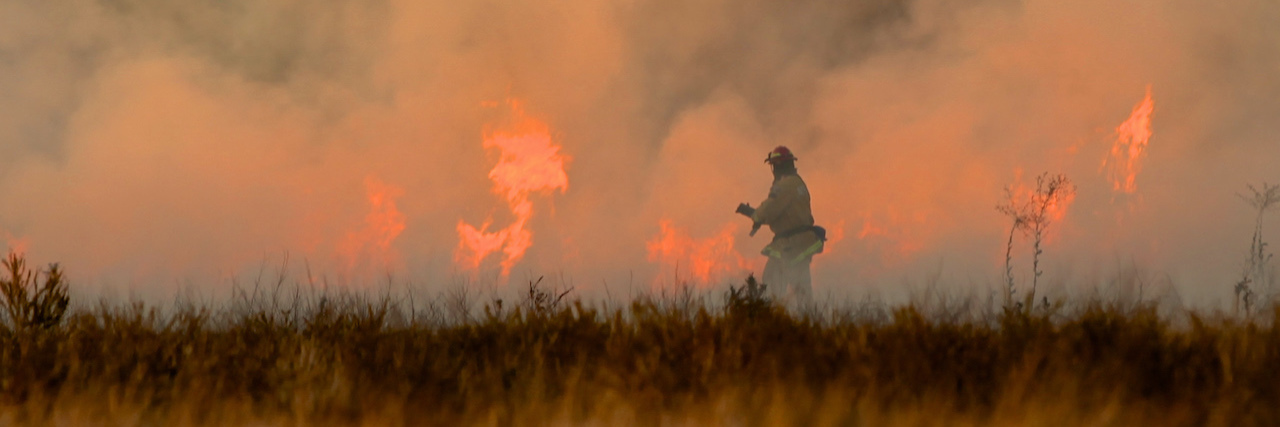It’s no surprise to anyone: 2020 has been an intense year. Everything seems emotionally elevated and more difficult than previous years, and many important issues have been brought to the forefront of our minds. One of the issues currently at the top of people’s minds on the West Coast is the devastating wildfires, which have collectively flattened millions of acres across California, Oregon and Washington. California has seen unprecedented numbers of wildfires burning at once, engulfing the state in smoke. Oregon has seen an “once in a generation” surge in wildfires, which has demolished much of Southern Oregon and claimed a handful of lives. And in eastern Washington, more than a dozen fires sparked over Labor Day weekend.
I’ve lived in California my entire life. I grew up in northern California, went to college in Santa Barbara and have lived in San Diego ever since. I’ve seen fires light up the skies in all three of those locations. In 2003, my first week of junior year was canceled due to hazardous air quality filled with ash. In 2007, I watched as flames grew across the freeway from my school and felt frantic as my mom and little sister evacuated back at home. In 2013, all of San Diego watched as fire claimed nearby neighborhoods. And of course, everyone cried as the town of Paradise was flattened in 2018. Every year we brace for “fire season,” and every year, it gets worse.
And every year, I feel heartbroken for our state.
2020 has brought unparalleled levels of anxiety as I watch my state burn down and my youngest sister pack her bags. Thirty-six hours after I headed back south from Medford, Oregon, after visiting her, the most devastating wildfires the state has ever seen closed the freeway and destroyed the surrounding towns. My sister’s old home was gone. Friends’ homes were gone. She sent me before and after photos of smoking rubble. And while the anxiety I was feeling is minimal compared to hers, the pull of helplessness and sadness keeps growing.
The thing with wildfires is that are fast, they are unpredictable and they are unforgiving. In some ways it’s second nature to be prepared to get out quickly, but in other ways, you can never prepare for the levels of paranoia, anxiety, depression and anger that hit when the skies turn blood orange, and a family member is on standby to get the hell out.
But just like 2020 itself, preparing for yet another gruesome fire season does come with its lessons and moments of reflection. First, the unpredictability of a fire is mirroring the illusion of control. Once you fully relinquish control, the unpredictability of anything, even something as huge as a wildfire, may feel less daunting. I tend to have a death grip on “control”… but really all I’m grasping is air. This isn’t to diminish the severity of the wildfires or to take away from the anguish of lives lost and homes burned. I’ve just learned that most of my personal anxiety is rooted in control and not having it. And that includes my inability to predict the fires and the where, how, why and when of them.
Second, the devastating blow of losing everything in a blaze truly shines a light on what matters. I’m not going to pretend I know what losing your house feels like — I’ve thankfully never had to go through that. But in the moments of “Are you safe?” texts, both numbers know that the only thing that matters is “Yes.” And that’s it. Sometimes simplifying it just to that simple idea helps lessen the stress in that moment.
Third, a community cannot be understated. During a text conversation with my sister, we both agreed that Talent, Oregon, will emotionally recover because of how small and how close-knit it is. The town is gone, but the spirit is not. And that’s what you see on the news and all around you once the flames are out. You can’t go through life without a community to support you, even when you’re shaking in a corner by yourself.
Fourth, it’s OK to have a really bad day and not feel guilty about it. I was recently sharing with my best friend that I felt guilty for feeling such deep sorrow for these fires when I haven’t lost a home, a loved one or really anything because of them. And that’s OK. I have pride for my state and love for the entire Pacific Northwest region and all its beauty. To see it destroyed and to know that next year will probably be worse is enough to make anyone break down in tears. It’s OK to not be OK, especially in 2020.
If you’re like me and struggling with images of tired firefighters, red skies, flattened neighborhoods and reports of bodies in cars, I get it. It’s a lot, and it’s OK that it’s a lot.
Getty image via Manny Chavez

